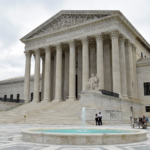Religious freedom is a cornerstone of American liberty, enshrined in the First Amendment and woven into the fabric of our nation’s founding. Yet, in recent years, government actions have increasingly threatened this fundamental right.
Consider the case of Little Sisters of the Poor, a Catholic nonprofit dedicated to serving the elderly poor. For years, the organization fought a federal mandate that required them to violate their deeply held religious convictions by forcing them to provide contraception coverage. This battle was fought for years until a 2020 Supreme Court victory sided with them
You would think a victory at the Supreme Court would settle the issue, but their troubles didn’t stop there. States like Pennsylvania and New Jersey pursued state-level mandates, forcing the nonprofit back into costly litigation. Furthermore, the Biden administration changed HHS rules to narrow religious exemptions, which directly risked the Sister’s ability to serve the elderly poor.
The Little Sisters case is not an outlier. During the COVID-19 pandemic, religious institutions faced blatant discriminatory policies, particularly in states like California and New York. Governors in these states imposed stringent restrictions on houses of worship, limiting or prohibiting in-person services while allowing secular venues—such as strip clubs, casinos, and retail stores—to operate with fewer constraints.
In California, for instance, churches were forced to close while nearby businesses remained open, prompting legal challenges that reached the Supreme Court. In South Bay United Pentecostal Church v. Newsom, the Court struck down some of these restrictions, affirming that religious institutions deserve equal treatment.
Yet, the initial policies chilled religious practice, forcing congregations to fight for their constitutional rights while secular industries faced less scrutiny. These disparities exposed a troubling bias against faith communities, undermining the principle of fairness under the law.
Addressing these abuses requires robust policy solutions rooted in America’s founding principles.
One approach is strengthening protections for religious liberty through targeted reforms, such as expanding conscience exemptions, safeguarding parental rights, and ensuring equitable treatment for religious institutions.
Recent efforts, like the establishment of a Religious Liberty Commission to advise on such policies, show promise in tackling anti-religious bias and government overreach at all levels of government. These steps, if implemented thoughtfully, could restore balance and protect the free exercise of faith.
Our America believes religious freedom is non-negotiable. By confronting government abuses and advocating for principled reforms, we can safeguard this sacred right for all Americans.
Let’s recommit to a nation where faith is respected, not restricted, and where liberty thrives for generations to come.

